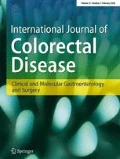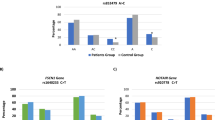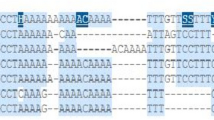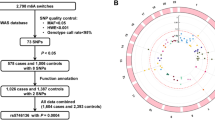Abstract
Introduction
Survivin is an apoptotic inhibitor, plays an important role in cell cycle regulation, and may be involved in the development and progression of cancer. A common polymorphism at the survivin gene promoter (-31 G/C) has been shown to influence survivin expression and the risk for cancer.
Aim
The aim of the present study was to investigate whether this polymorphism could be involved in the sporadic colorectal cancer (CRC) development, prognosis, and survival.
Materials and methods
The -31G/C polymorphism of survivin promoter was analyzed by polymerase chain reaction (PCR) restriction fragment length polymorphism method in biopsies from 312 patients with sporadic CRC and 362 healthy individuals. Survivin messenger RNA (mRNA) expression in CRC tissues was detected by quantitative reverse transcriptase PCR.
Results and discussion
The genotype frequencies for -31GG, -31GC, and -31CC were 21.79%, 41.99%, and 36.22% in CRC patients and 33.98%, 45.03%, and 20.99% in healthy subjects, respectively. The frequencies of the survivin -31C allele and CC genotype were significantly higher in CRC patients than in healthy subjects (p < 0.0001). Homozygotes for the -31CC survivin genotype, expressed 1.6-fold higher mRNA levels of survivin compared to cases with the -31GG and -31GC genotypes.
Conclusion
The -31CC genotype of survivin promoter is associated with CRC and may be a risk factor for CRC.


Similar content being viewed by others
References
Thompson CB (1995) Apoptosis is the pathogenesis and treatment of disease. Science 267:1456–62
Raff M (1998) Cell suicide for beginners. Nature 396:119–22
Ambrosini G, Adida C, Alteri DC (1997) A novel anti-apoptosis gene, survivin, expressed in cancer and lymphoma. Nat Med 3:917–21
Deveraux QL, Reed JC (1999) IAP family proteins—suppressors of apoptosis. Genes Dev 13:239–252
Li F, Ambrosini G, Chu EY et al (1998) Control of apoptosis and mitotic spindle checkpoint by survivin. Nature 396:580–584
Altieri DC (2001) The molecular basis and potential role of survivin in cancer diagnosis and therapy. Trends Mol Med 7:542–547
Liston P, Fong WG, Korneluk RG (2003) The inhibitors of apoptosis: there is more to life than Bcl2. Oncogene 22:8568–8580
Yamamoto T, Tanigawa N (2001) The role of surviving as a new target of diagnosis and treatment in human cancer. Med Electron Microsc 34:207–212
Tamm I, Wang Y, Sausville E et al (1998) IAP-family protein surviving inhibits caspase activity and apoptosis induced by Fas (CD95), Bax, caspases, and anticancer drugs. Cancer Res 58:5315–5320
Asanuma K, Moriai R, Yajima T et al (2000) Survivin as a radioresistance factor in pancreatic cancer. Jpn J Cancer Res 91:1204–1209
Velculescu VE, Madden SL, Zhang L et al (1999) Analysis of human transcriptomes. Nat Genet 4:387–388
Altieri DC, Marchisio PC, Marchisio C (1999) Survivin apoptosis: an interloper between cell death and cell proliferation in cancer. Lab Invest 79:1327–1333
Xu Y, Fang F, Ludewig G et al (2004) A mutation found in the promoter region of the human survivin gene is correlated to overexpression of survivin in cancer cells. DNA Cell Biol 23:527–537
Kinzler KW, Vogelstein B (1996) Lessons from hereditary colorectal carcinoma. Cell 87:159–170
Sarela A, Macadam R, Farmery S, Markham A, Guillou P (2000) Expression of the antiapoptosis gene, Survivin, predicts death from recurrent colorectal carcinoma. Gut 465:645–650
Kawasaki H, Altieri DC, Lu CD et al (1998) Inhibition of apoptosis by survivin predicts shorter survival rates in colorectal cancer. Cancer Res 58:5071–5074
Borbely AA, Murvai M, Szarka K et al (2007) Survivin promoter polymorphism and cervical carcinogenesis. J Clin Pathol 60:303–306
Jang JS, Kim KM, Kang KH et al (2008) Polymorphisms in the survivin gene and the risk of lung cancer. Lung Cancer 60:31–39
Cheng ZJ, Hu LH, Huang SJ (2008) Correlation of -31G/C polymorphisms of surviving promoter to tumorigenesis of gastric carcinoma. Ai Zheng 27:258–263
Morson BC, Sobin LH (1976) Histologic typing of intestinal tumours: WHO technical report. WHO, Geneva
Sobin LH, Wittekind C (1997) UICC TNM classification of malignant tumours. Fifth Edition. Wiley-Liss, New York
Author information
Authors and Affiliations
Corresponding author
Rights and permissions
About this article
Cite this article
Gazouli, M., Tzanakis, N., Rallis, G. et al. Survivin -31G/C promoter polymorphism and sporadic colorectal cancer. Int J Colorectal Dis 24, 145–150 (2009). https://doi.org/10.1007/s00384-008-0601-2
Accepted:
Published:
Issue Date:
DOI: https://doi.org/10.1007/s00384-008-0601-2




